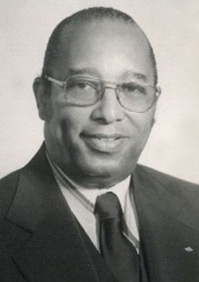Charles E. Bussey Jr., was the first African American mayor of Little Rock, Arkansas. He was also the first African American elected to serve on the Little Rock City Board of Directors (City Council) since Reconstruction and the first African American deputy sheriff of Pulaski County. Bussey was born in Stamps, Arkansas on December 18, 1918, to Charles Bussey Sr. and Annie Bussey and Charles Bussey who had seven other children. Bussey graduated from Stamps public schools and attended Bishop College in Marshall, Texas. He also served in the U.S. Army as a private during World War II.
On October 6, 1945, Bussey married Maggie B. Clark. They had two sons. Two years later in 1947, he was elected Little Rock’s “bronze mayor,” that is, the unofficial mayor of the Little Rock Black community. Bussey was a Mason and an active Shriner, obtaining the Thirty-third Degree, a prestigious rank within these organizations that are awarded for exceptional service and dedication.
From 1950 to 1969, Bussey served as deputy sheriff of Pulaski County and was instrumental in organizing and managing the Junior Deputy Baseball Program. From 1969 to 1976 and from 1979 to 1990, Bussey served on the Little Rock City Board of Directors (City Council). During his time on the Board, Bussey served eight years as vice mayor. He held the post longer than anyone else in that position. In November 1981, Bussey was selected as Mayor of Little Rock by fellow Board members, serving in that capacity for 13 months until December 1982. He was the first African American to hold that post.
In 1994, Bussey organized and produced a television show, Center Stage, and was influential in negotiating the formation of the Black Access Channel 14 in Little Rock. Bussey also served as president of the Arkansas Lung Association, West Little Rock Rotary Club, Arkansas Livestock Association, Shriners, and Elks. He organized the Junior Deputy Sheriffs, where he managed baseball teams and other activities to keep young people off the streets, and served on the Board of Directors of St. Vincent Infirmary Medical Center.
Charles E. Bussey Jr. died on June 15, 1996, in Little Rock, Arkansas. He was 78. In 2005, 30 blocks of 20th Street were renamed Charles Bussey Avenue in his honor. He was also posthumously inducted into the Arkansas Black Hall of Fame. The Charles Bussey Child Development Center in Little Rock also bears his name and in 2015, he was included in the Arkansas Civil Rights Heritage Trail.
Do you find this information helpful? A small donation would help us keep this available to all. Forego a bottle of soda and donate its cost to us for the information you just learned, and feel good about helping to make it available to everyone.
BlackPast.org is a 501(c)(3) non-profit and our EIN is 26-1625373. Your donation is fully tax-deductible.
Arkansas Martin Luther King, Jr. Commission, “Arkansas African American History Makers,”
chrome-extension://efaidnbmnnnibpcajpcglclefindmkaj/https://dese.ade.arkansas.gov/Files/20201210121222_kingbk.pdf.
“Little Rock Look Back: Charles E. Bussey Jr. born 100 years ago,”
https://lrculturevulture.com/2018/12/18/little-rock-look-back-charles-e-bussey-jr-born-100-years-ago/;
Stephanie Jackson, “Black History Month First: Charles E. Bussey, Jr.,”
https://onlyinark.com/culture/charles-e-bussey-jr/.

